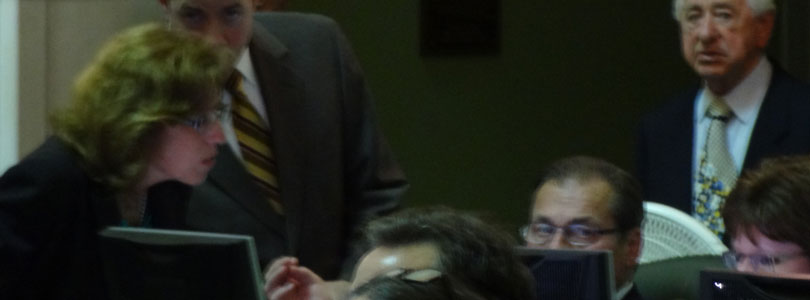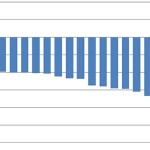Afterthoughts
When you’ve been writing play-by-play commentary on procedurally nuanced politics and shaky legislation for seven hours, the space in your mind that had been occupied remembering to type “a.m.” rather than “p.m.” can finally turn to two general questions: At what point are events so predetermined that I can go home? And isn’t there a better way to make laws?
Smaller observations punctuate the evening. For one, you can tell a lot about a lawmaker by the looks he gives you when you walk into an ad hoc late-night committee meeting with a video camera. You can also tell, just being there, that the real action takes place where you cannot be. When a chairwoman seems to startle a committee member with the announcement that he’d just seconded a motion, and when the Senate President repeatedly addresses the floor manager with passive-aggressive instructions like “is it your intention to pluck bill number X from thin air?,” it’s pretty clear that the screenwriters, not the actors, are the real attraction.
So, yes, it is absurd to have legislators making the final, binary decisions about laws affecting the lives of all Rhode Islanders just yesterday’s side of sunrise, but at that point the old adage about studying applies almost without modification: If you don’t know the answers the night before, you probably won’t know them for the test. Apart from a few backroom deals and loose ends, the plays of the evening have already been scripted by the time the fabled last night of the legislative session gets underway.
That isn’t an altogether unhealthy development. Suspending rules may be a tradition, but there are only so many such strings power brokers can sever before their hands begin to take on the reddish hue of the guilty. Moreover, when the State House is swarming with the various forms of straight-to-Internet media (and people dying to make use of the technology) counting on coverups after the fact is a risky proposition.
At least leadership can’t reshape the face of Rhode Island government in one unannounced swoop at the witching hour. For the really big stuff, there has to be a trail, and there will be an aftershock.
But that’s a long way from good government, and on the day after the final gavel strikes, it’s natural to wonder what steps would bring us the rest of the distance.
On his afternoon WPRO radio show, Dan Yorke called on voters to insist that candidates for office pledge not to conduct any legislative business after midnight. Term limits are another popular solution. How about writing the operational rules of the House and Senate into the general laws or the state constitution? In the case of real emergencies, a unanimous body and consenting governor could waive a problematic provision.
No doubt, Rhode Island’s best and most well-meaning political minds could contrive an excellent list of tweaks that might (just might) tighten the deliberate obstacles to corruption. Ultimately, though, the great majority of the problems arising from the General Assembly could be resolved as instantly and easily a large piece of card stock slides into a ballot machine. Rhode Island simply needs greater political diversity and opposition of powers along the aisle.
Too often, the electorate thinks of politics as a sport, with good guys and bad guys. Politicians may not be purely either, but partisan victory gives voters a sense of their own team’s winning.
The problem is that it’s far too natural for politicians to see the game from the other direction. The more voters and constituencies they can amass, the more they win. At some point, the observer has to conclude that these two perspectives aren’t those of different positions on the field, but of different teams. The voters are on one side, and the vote getters are on the other.
To a liberal, the worst possible outcome may appear to be a conservative policy enacted into law. But the Rhode Island experience shows that the worst possible outcome is actually when left-leaning insiders can take for granted that nobody else across the spectrum has any chance of winning in a public procedural match.
At that point, the wrestling among allies and opponents alike moves behind closed doors, where all variety of special interests are able to play, introducing complex webs of incentives and self interest. And at that point, we wind up with all-night legislative sessions.
The marathon to the final recess may be the last means of ensuring compliance — “the exhaustion of the minions,” as Yorke put it — with late-middle-age legislators’ wanting nothing so much as to go home. But even that strategy would bear rejuvenated risk were there any chance that tired and agitated senators and representatives, whom fellow Rhode Islanders did in fact vest with power, might rebel.
Just as no economic policy that is not bold and striking can thrust Rhode Island from its doldrums, no mere tweaks of promises (or promises of tweaks) can restore the state’s civic sphere to healthy operation.




